
Conservation Science and Practice
Scope & Guideline
Empowering ecological solutions for a sustainable tomorrow.
Introduction
Aims and Scopes
- Interdisciplinary Research:
The journal publishes studies that bridge ecological research, social sciences, and policy analysis, promoting a holistic approach to conservation that incorporates diverse perspectives and methodologies. - Applied Conservation Strategies:
Focus on practical applications of conservation science, including case studies, management strategies, and policy recommendations that address real-world conservation challenges. - Biodiversity and Ecosystem Management:
Research that highlights the importance of biodiversity and ecosystem services, including studies on species recovery, habitat restoration, and the impacts of human activities on ecosystems. - Human Dimensions of Conservation:
Exploration of the social, economic, and cultural factors that influence conservation practices, including community engagement, stakeholder perceptions, and the socio-political context of conservation efforts. - Climate Change Adaptation:
Studies that address the impacts of climate change on biodiversity and ecosystems, including strategies for enhancing resilience and mitigating adverse effects.
Trending and Emerging
- Community-Based Conservation:
An increasing focus on community-led conservation initiatives that engage local populations in decision-making processes and leverage traditional knowledge to enhance conservation outcomes. - Climate Resilience and Adaptation Strategies:
A trend towards research that develops and evaluates adaptive strategies for biodiversity conservation in the face of climate change, emphasizing resilience and long-term sustainability. - Intersectoral Collaboration:
Growing recognition of the importance of collaboration across sectors, including health, agriculture, and urban planning, to address complex conservation challenges and enhance ecosystem services. - Technological Innovations in Conservation:
Emerging research on the use of technology, such as remote sensing, genetic tools, and citizen science platforms, to enhance conservation monitoring and management efforts. - Focus on Systemic Change and Policy Reform:
A trend towards advocating for systemic changes in policy frameworks and governance structures to create enabling environments for effective conservation actions.
Declining or Waning
- Traditional Species-Centric Approaches:
There is a noticeable decline in studies that focus solely on individual species conservation without considering broader ecological contexts or community dynamics, as the field increasingly recognizes the need for ecosystem-level approaches. - Top-Down Conservation Policies:
Research emphasizing top-down, regulatory approaches to conservation is becoming less prominent, with a growing emphasis on participatory and community-based strategies that empower local stakeholders. - Invasive Species Management:
While still important, the volume of research specifically dedicated to invasive species management appears to be waning, possibly due to a broader focus on integrated ecosystem management and holistic restoration approaches. - Conventional Conservation Metrics:
There is a shift away from traditional metrics of conservation success, such as species counts, towards more comprehensive assessments that consider ecosystem health, resilience, and socio-economic factors. - Prescriptive Conservation Guidelines:
The prevalence of prescriptive conservation guidelines is decreasing as the field moves towards adaptive management frameworks that allow for flexibility and responsiveness to changing conditions.
Similar Journals
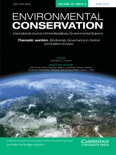
ENVIRONMENTAL CONSERVATION
Leading the Charge in Environmental Research and ImpactENVIRONMENTAL CONSERVATION, published by Cambridge University Press, is a premier academic journal dedicated to advancing the field of environmental science and conservation. Since its inception in 1974, this journal has established a robust reputation, currently holding prestigious rankings in various categories including Q1 in Nature and Landscape Conservation and Q1 in Water Science and Technology, alongside notable Q2 rankings across several related fields. With its broad scope, ENVIRONMENTAL CONSERVATION covers critical topics in health, toxicology, pollution control, and environmental policy, making it an essential resource for researchers, professionals, and students aiming to address the pressing challenges of environmental sustainability. Despite not being an open-access journal, its impactful content, demonstrated by its significant positions in Scopus rankings, enhances scholarly discourse and informs policy worldwide. As we approach its 50th anniversary, this journal remains pivotal in fostering innovative research and promoting best practices in environmental stewardship.

Frontiers in Conservation Science
Advancing the Future of Biodiversity PreservationFrontiers in Conservation Science, published by Frontiers Media SA in Switzerland, is an esteemed open-access journal dedicated to advancing research in the field of conservation science. With an E-ISSN of 2673-611X, this journal aims to facilitate the exchange of knowledge among researchers, professionals, and students by publishing high-quality, peer-reviewed articles that explore innovative solutions to contemporary conservation challenges. Since its establishment in 2020, the journal has rapidly ascended to a Q2 ranking in the Nature and Landscape Conservation category, reflecting its commitment to impactful scholarship, as evidenced by its Scopus rank of #93 out of 211 in Environmental Science and a 56th percentile ranking. By promoting open access, Frontiers in Conservation Science ensures that vital research is widely disseminated, fostering collaboration and informed decision-making in the conservation community. This journal is a crucial platform for those dedicated to understanding and preserving our planet's biodiversity and landscapes.

Euro-Mediterranean Journal for Environmental Integration
Empowering Research for Lasting Environmental ImpactThe Euro-Mediterranean Journal for Environmental Integration, published by SPRINGER HEIDELBERG, serves as a pivotal platform for interdisciplinary research in the realm of environmental science, particularly focused on the unique ecological and socio-economic context of the Euro-Mediterranean region. With its ISSN 2365-6433 and E-ISSN 2365-7448, this journal aims to foster a collaborative approach to environmental challenges, integrating insights from various fields such as ecology, geography, and sustainable development. Since its inception in 2016, it has made significant strides, achieving a Q3 ranking in Environmental Science and maintaining a notable position within the Scopus rankings, sitting at #102 out of 233 in the general environmental science category, which reflects its growing influence in academic discourse. The journal is committed to open dialogue among researchers, professionals, and students aimed at advancing knowledge and promoting innovative solutions to pressing environmental issues. Access to its comprehensive articles and findings will be key to contributing to a more sustainable future.

AMPHIBIAN & REPTILE CONSERVATION
Fostering Collaboration for a Sustainable FutureAMPHIBIAN & REPTILE CONSERVATION, published by the Amphibian Conservation Research Center & Lab, is a leading journal dedicated to the field of herpetology and environmental conservation. With an ISSN of 1083-446X and an E-ISSN of 1525-9153, this journal serves as a vital resource for researchers, conservationists, and students interested in the preservation of amphibian and reptile species. The journal has achieved remarkable rankings, categorized in the Q2 quartile for Animal Science and Zoology, Ecology, and Nature and Landscape Conservation as of 2023, reflecting its significant contribution to the scientific community. Over the converged years from 2016 to 2024, the journal has established itself as an integral platform for disseminating research findings, fostering collaboration, and enhancing the understanding of biodiversity and ecosystem dynamics. By embracing an open-access approach, AMPHIBIAN & REPTILE CONSERVATION ensures that critical research is readily available to a global audience, promoting informed conservation efforts and policy advocacy to safeguard these vital species amidst their declining populations.
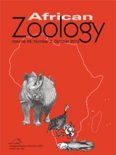
AFRICAN ZOOLOGY
Celebrating the Diversity of Animal LifeAFRICAN ZOOLOGY, published by Taylor & Francis Ltd, stands as a significant journal in the realm of Animal Science and Zoology, with a proud history dating back to 1996 and slated to continue until 2024. With an ISSN of 1562-7020 and E-ISSN 2224-073X, this journal provides a reputable platform for researchers and practitioners dedicated to the study of animal biology across the African continent. It has been recognized for its quality scholarship, evidenced by its Q3 categorization in the 2023 Scopus quartile rankings and an impressive rank of #182 out of 490 within its field. As an open-access journal, it facilitates the dissemination of vital research findings and promotes broader accessibility, catering to a diverse audience of professionals, scholars, and students alike. The journal aims to enhance our understanding of wildlife, conservation, and ecosystem dynamics in Africa, fostering collaborations that address critical ecological challenges. For researchers and enthusiasts keen on contributing to and staying informed about advancements in zoological science, AFRICAN ZOOLOGY is an essential resource that enriches the global discourse on biodiversity and conservation efforts.
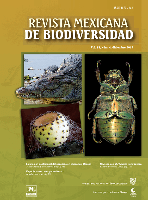
Revista Mexicana de Biodiversidad
Illuminating the Path to Biodiversity PreservationRevista Mexicana de Biodiversidad is a prominent academic journal dedicated to the field of biodiversity and conservation, published by the prestigious Instituto de Biología, Universidad Nacional Autónoma de México. Since its inception as an Open Access publication in 2005, it has aimed to disseminate high-quality research that advances the understanding of biological diversity in Mexico and beyond. With an ISSN of 1870-3453 and an E-ISSN of 2007-8706, the journal caters to a diverse audience, including researchers, professionals, and students, by providing vital insights into ecological studies, conservation strategies, and the sustainable management of natural resources. The journal is committed to fostering scientific collaboration and promoting the significance of biodiversity in addressing contemporary environmental challenges. By publishing innovative and impactful research, the Revista Mexicana de Biodiversidad plays an essential role in the global discourse on biodiversity conservation.
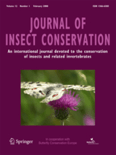
JOURNAL OF INSECT CONSERVATION
Championing the Study of Insect BiodiversityJOURNAL OF INSECT CONSERVATION, published by SPRINGER in Switzerland, is a leading peer-reviewed journal that focuses on the preservation and study of insect biodiversity and ecology. With an ISSN of 1366-638X and E-ISSN 1572-9753, this journal represents a vital resource for researchers and practitioners in the fields of Animal Science, Ecology, and Insect Science. The journal consistently ranks among the top quartiles, achieving Q1 status in Animal Science and Zoology and Q2 in other pertinent categories in 2023, according to Scopus rankings. This reflects its significant influence in the academic community, with a solid impact factor that highlights its importance in advancing the discourse on insect conservation. Though not an open access journal, it provides critical insights and innovative research findings from 1997 to 2024, making it an essential platform for those involved in the conservation of insect species and their habitats. As a scholarly resource, the JOURNAL OF INSECT CONSERVATION is dedicated to fostering knowledge dissemination and inspiring future research in pressing environmental issues.
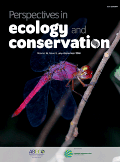
Perspectives in Ecology and Conservation
Transforming conservation science through rigorous analysis.Perspectives in Ecology and Conservation, published by Elsevier Science Ltd, is a leading academic journal dedicated to advancing the fields of ecology, conservation, and environmental management. With a Q1 ranking in multiple categories, including Ecology, Management, Monitoring, Policy and Law, and Nature and Landscape Conservation, this journal boasts an impressive standing among its peers, making it essential reading for researchers and professionals. Since its inception in 2017 and running through 2024, it aims to provide innovative perspectives and critical analyses that enhance our understanding and practices in conservation science. The journal is accessible through open access options, facilitating broader dissemination of knowledge. Its commitment to addressing contemporary ecological challenges reinforces its importance in the academic community, promoting sustainable practices and informed policy-making in the face of urgent environmental issues.

Folia Oecologica
Connecting Global Scholars in Ecological Studies.Folia Oecologica is a distinguished open-access journal published by WALTER DE GRUYTER GMBH, focusing on critical research in the fields of agricultural and biological sciences, ecology, and forestry. Established as a vital platform for the dissemination of knowledge, this journal has been providing free access to its valuable content since 2017, catering to an international audience engaged in environmental and ecological studies. With its ISSN 1336-5266 and E-ISSN 1338-7014, Folia Oecologica has earned notable ranks in Scopus, placing it in the 62nd percentile for Agricultural and Biological Sciences and the 50th percentile for Environmental Science. The journal's commitment to high-quality research is reflected in its positions in the Q2 and Q3 quartiles across various categories in 2023. As it converges years from 2006 to 2024, Folia Oecologica continues to foster scholarly dialogue and collaboration among researchers, professionals, and students, making significant contributions to the understanding and preservation of our ecological systems.
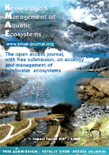
Knowledge and Management of Aquatic Ecosystems
Advancing Solutions for Sustainable Aquatic EcosystemsKnowledge and Management of Aquatic Ecosystems, published by EDP SCIENCES S A, is a premier open-access journal dedicated to the interdisciplinary study of aquatic ecosystems. With an ISSN of 1961-9502 and an impressive history since 1928, this journal serves as a vital resource for researchers and professionals in the fields of Ecology, Aquatic Science, Water Science and Technology, and Nature Conservation. The journal has consistently achieved high rankings, including a Q2 classification in multiple categories, which underscores its significant contribution to the evolving landscape of aquatic research. With access options that promote widespread dissemination of knowledge, Knowledge and Management of Aquatic Ecosystems aims to bridge gaps in research, policy, and practical applications, making it an invaluable asset for students, researchers, and policymakers aiming for impactful solutions in aquatic management and conservation.